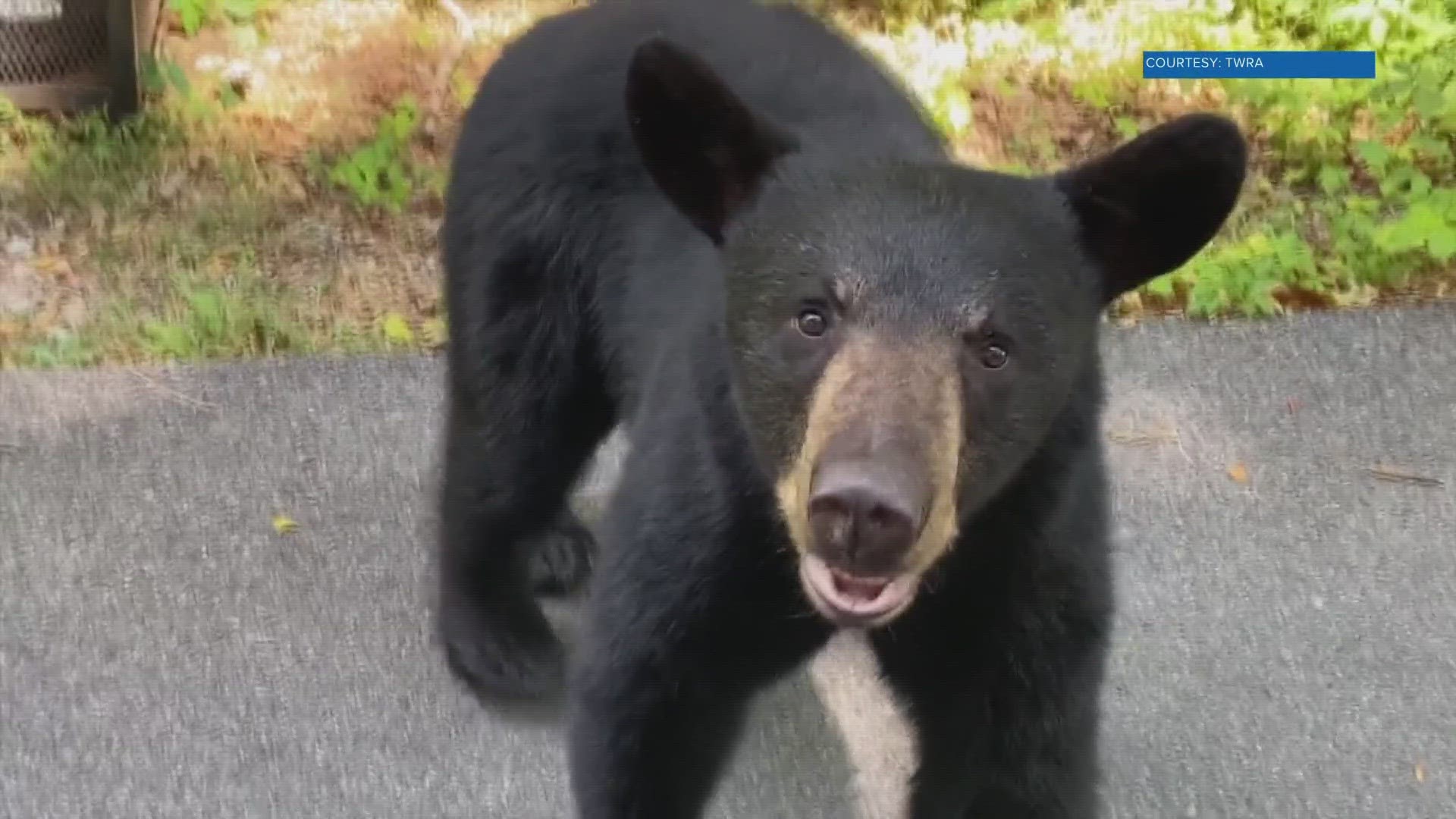KNOXVILLE, Tenn. — East Tennessee is home to only one kind of bear — the black bear. And right now, these bears are either already living in dens or will soon go into dens for the winter.
"Typically, what we see a lot of here in Tennessee, especially in the Smoky Mountains are tree dens," said Janelle Musser, a black bear biologist for the Tennessee Wildlife Resources Agency. "So trees that have rotted out, the bears will climb in the top of them and go down in and they'll be in the base of that tree. The other thing they really like is if a tree falls over and the root ball comes up, they can make that a really nice hole to cover themselves with vegetation. That's kind of the other type of den that they'll do is they'll actually go under a big pile of leaves or something like that, and almost excavate a small hole to go in. So they're looking for something that's going to be safe, most likely secluded, keep them somewhat warm, and also not get water in it."
Bears usually den in trees, but they might also find a cozy place to rest in or near homes in the area, which can cause many problems.
"They will pull down electrical wiring, all sorts of insulation, they will chew on any type of wood that's in there that may be a part of your floor, your foundation," said Musser. "So it's more of a property damage issue and the risks that that can pose."
Musser says Sevier County and Blount County are more likely to have bear dens around people since the bears are more used to human activity and the undersides of homes are usually warm.
"If you've ever felt underneath the house or even a shed or structure, those places stay warm," said Musser. "It's already a part of their normal home range. They're used to that area. And so we see that a lot. However, other states see it as well, in places. If people have a cabin, per se, that maybe they use in spring and summer and fall but they're vacant during the winter, that can create a really nice place as well because there is no activity and yet they usually still have the heat on to a certain extent to keep pipes from freezing that kind of thing."
The Appalachian Bear Rescue has even taken in cubs from underneath a house on rare occasions.
"That's very uncommon, but it has happened before. We have actually taken in cubs from underneath the house," said Bailey DeLozier Daining, a curator at the Appalachian Bear Rescue. "It's a very warm spot for them to find. Obviously, it gets pretty cold here sometimes. And that's just an easy spot for them to get to. They're very opportunistic in finding a place to den. So sometimes, they'll den under trees and will den in the top of trees, which is strange, but it does happen. As well as ground-ins. Will you'll see them burrow under rocks and downed trees such as that as well."
Musser and DeLozier Daining want people to know a bear making a den under your home is very unlikely, but there are signs to look out for in case one does.
"Oftentimes people know because they're seeing the bear go under it," said Musser. "It's usually a security camera that has caught footage of it. Because the bears are pretty sneaky. And, like I said, they still want to avoid us. The other thing that I've heard from homeowners is that, like I said, they cause property damage. So they'll notice that their heat is not very good in their house or their cabin, or they may hear noises of scratching or chewing. Because, bears will pull down insulation, and will pull down wiring. They may hear some of those noises as well. And also just the obvious signs of if you have a crawlspace door, and it's all broken apart and opened up."
The experts said bears den because their food supply gets lower during the cooler months, but if humans leave their food out, it can be an open invitation for them to stay out for longer.
"So when the fall comes, like, acorns run out, those bears should go into a den," said Musser. "But if they can get garbage or birdseed or pet food, they will keep themselves awake. But, they are oftentimes really slow-moving, sluggish animals, still, because their body is telling them to slow down, but there's still food, they want to take advantage of it."
In order to limit a bear making your yard or home their winter home, you should make sure cellar and shed doors are closed and locked, cover any openings under your porch and avoid leaving any food or garbage outside.
If you're camping in the Great Smoky Mountains, there are rules to follow, too.
"Make sure if you're out on the trails this time of year, just make sure to double-bag food," said DeLozier Daining. "Make sure to throw away your trash properly if you happen to be coming to a high tourist area. Don't leave anything behind including seemingly harmless things, such as apple cores, and banana peels."
If you encounter a bear, people are also encouraged to call the TWRA.
"If, in a couple of months here, if there's a bear in a den under a house or something, we really want to make sure that they don't have cubs with them," said Musser. "So, we have to be really careful when we scare a bear out of its den to make sure we know there's not cubs, or if we suspect they're ours. We're going to handle that in a much different way. So it's really important that people contact the agency as opposed to trying to do it themselves."

